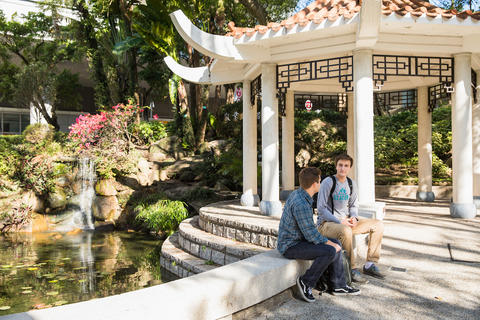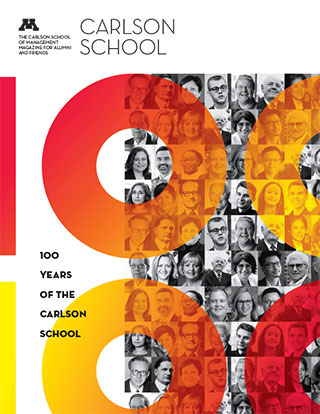
The Importance of Global Learning
Monday, October 7, 2019
BY TAYLOR HUGO
Last year on Christmas Day, Elyse Terlion discovered a taste of home nearly 4,700 miles away from Minnesota. The college senior had recently landed in Austria for a 16-day study abroad program, and as she had done every year growing up, she was about to watch the Nutcracker ballet—except this time at the Vienna State Opera, Wiener Staatsoper.
“It was really exciting to see such a historic performance in a historic venue,” says Terlion, who studied finance and graduated with a BSB in May. “I feel like I walked away with a good experience of the actual city and culture itself.”
Terlion is one of hundreds of students from the Carlson School of Management who study abroad every year. During the 2018-2019 school year alone, 856 students—742 undergraduates and 114 graduate students—studied in 33 countries ranging from Argentina and New Zealand to Norway and Thailand. Additionally, there were 110 exchange students and 66 Global Executive Master of Business Administration students who visited our campus from partner schools around the globe.
These impressive numbers are the result of a requirement the school put into effect 10 years ago: All students, at both the undergraduate and graduate levels, must complete a global learning experience in order to earn their degree—an unprecedented stipulation, at the time, for business schools across the country.
Meaningful Global Experiences for All
Before the International Experience was integrated into the curriculum, about 50 percent of Carlson School students were already choosing to go abroad. But to get to near 100 percent participation, the Carlson Global Institute (CGI) needed to be flexible.
“Faculty and staff leaders decided early on that we would not have 50, 60, 75 students going abroad all at once in a single program,” explains Anne D’Angelo, assistant dean of Global Initiatives. “We felt that would dilute the experience for student learning and development. So we needed to increase the number of courses and develop new and more innovative models of going abroad, versus fewer programs and sending all the students at one time.”
Carlson School faculty and staff also recognized the need to “meet students where they are,” adds D’Angelo, referring to the variety of courses to choose from. There are short-term, faculty-led Global Enrichment Programs that start on the Twin Cities campus with a class on international business, for instance, and culminate in two weeks abroad, as well as Global Immersion Programs, where students spend a summer or semester studying or interning in their chosen country. The Carlson School also partners with the university-wide Learning Abroad Center to offer even more options.
Courses run the gamut from business communication in Spain to corporate social responsibility in Costa Rica, but undergrad students can even craft their own study abroad program, as Terlion did. Because of her position on the U of M rowing team, which is a year-round sport, she needed a flexible international experience that fit into her academic and athletic schedules.
“It was up to me to build my own experience, find the contacts, and then also figure out how to allocate my time in terms of the research and compiling the materials,” says Terlion, who, prior to her departure, worked with an advisor to write a proposal on what she intended to study—the coffee house culture of Vienna. “It forced me to think a lot more things through than I might have otherwise.”
Preparing Students to Work in Global Businesses
Gaining this sense of independence and self-awareness is just one of the goals Carlson hopes students will achieve by the end of their programs, along with being exposed to the culture and economy of another country, and learning how to succeed in business, no matter the situation—such as engaging with today’s entrepreneurs in Cuba, and how they’ve navigated their regulatory environment and limited internet access.
“The world is highly connected,” says Deirdre Opp, an Education Abroad program director with CGI who oversees a portfolio of the Carlson School’s short-term and internship programs. “Having skills to better understand where people are coming from—knowing the social, political, and economic concepts that are driving different decision-makers out there—is really critical.”
CGI’s mission is to expand the Carlson School's vision beyond the Twin Cities campus by forging relationships with the international community. One way it does this is through partnerships with business schools around the world to offer programs geared toward students and business professionals already living and working in Europe and Asia. This includes executive MBA programs at the Vienna University of Economics and Business in Austria and Lingnan (University) College of Sun Yat-sen University in China, a medical industry-focused MBA with Tongji University in China, and a Doctor of Business Administration through the Tsinghua University of Economics and Management, also in China.
Other business schools now look to the Carlson School as an example of how to successfully incorporate a study abroad requirement, prompting invitations to speak at and host conferences for organizations like NAFSA: Association of International Educators, the world’s largest nonprofit association dedicated to international education and exchange. But most impactful, perhaps, is the relationship CGI has fostered with more than 100 different corporate, government, and nonprofit partners in the community and around the globe for a “common goal to learn together, grow together, and develop together,” says D’Angelo.
When students come out of school, they may not have an international assignment right away, but ultimately, many of them do. Even if they don’t have an international assignment, they will be interacting with international individuals, and they’re in a much better position to deal with it, to be successful at it, to be comfortable with it.
Top Companies Inform the Curriculum
The CGI Advisory Council offers a snapshot of these partnerships. The 15-person board made up of executives from 3M, Best Buy, Cargill, Ecolab, General Mills, Hormel, Medtronic, and other Twin Cities powerhouse companies helps facilitate the connection between CGI and the business community, guiding programming based on their professional, real-time experience.
Cargill, for example, recently hosted a Global Business Practicum for graduate students of Carlson and the Warsaw School of Economics in Poland. During the two weeks there, U.S. students, along with their Polish MBA peers, finalized recommendations for how Cargill could grow its non-caloric sweetener business across Europe.
“What we got in return from the practicum was a completely different way of looking at the opportunity,” says Joe Ramaker, a 1998 graduate of the Carlson School’s MBA program who currently serves as Cargill’s corporate vice president of finance, global operations, and supply chain, and chair of the CGI Advisory Council. “We are a very historically asset-driven business, so we would always come at a problem with, ‘OK, how do we wrap our assets around this?’ or, ‘What do we have to go build?’ The class that went there came at it from a totally different angle of consumer trends. How are consumers shaping their views in a more digital way? How are they accessing information and trying to understand where the ingredients in their food come from?”
This mutually beneficial arrangement—with students getting real, hands-on experience, and companies tapping into the fresh perspective of the next generation of business leaders—is a prime example of how the Carlson School’s global learning initiatives are preparing graduates for the workforce.
“When students come out of school, they may not have an international assignment right away, but ultimately, many of them do. Even if they don’t have an international assignment, they will be interacting with international individuals, and they’re in a much better position to deal with it, to be successful at it, to be comfortable with it,” says Michael Houston, associate dean of Global Initiatives. The Carlson School not only prepares students to go abroad but also coaches them once they return home, honing interview skills to help soon-to-be graduates articulate their international experiences to prospective employers.
Setting an Example for the Entire University
When asked why other University of Minnesota colleges haven’t incorporated a study abroad requirement, Meredith McQuaid, assistant vice president and dean of international programs for the entire University system, points to the fact that globalization may tend to play a stronger role in professional programs, like those offered by Carlson, compared to academic programs. Buy-in and support from staff and faculty are also extremely important.
“Carlson really sees the direct link between career choices and internationalization awareness,” says McQuaid, who is also a member of the CGI Advisory Council. “Having worked in this field for more than 20 years, I have seen first hand that any student benefits from an international experience, and I do think more deans and department heads are becoming aware of that, but it requires a lot of investment of personnel and training, and not all colleges are in a position to do that.”
Despite the fact that the Carlson School is already considered a leader in the space of global experiential learning, CGI is constantly evaluating programming to improve courses, expand its portfolio of countries, and strengthen the experience for students and the people with whom they interact in their host cities.
“Education abroad is not what it was 10, 20 years ago. It really is more intentional from a curricular standpoint—project-based applications and meeting critical global learning outcomes,” says D’Angelo, who is currently examining how faculty, staff, and students could enhance their teaching and learning by cultural intelligence, or CQ, a globally recognized way of assessing and improving effectiveness in culturally diverse situations. “It helps to articulate one’s own individual culture—Where am I from? Who am I?—and also other’s.” And it is one of the Carlson School’s alumna, Distinguished University Professor in Management Soon Ang at Nanyang Technological University in Singapore, who pioneered and co-authored two foundational books on CQ.
It’s this type of research that keeps the Carlson School on the forefront of global learning and positions the school as a sought-after institution to receive a business degree, as some students are enrolling specifically for the study abroad requirement. “Students come away from these experiences changed,” says McQuaid. “Carlson has positively shaped attitudes about studying abroad for the entire University of Minnesota system, and has helped other universities and colleges think more about the importance of study abroad.”
Carlson has positively shaped attitudes about studying abroad for the entire University of Minnesota system, and has helped other universities and colleges think more about the importance of study abroad.



